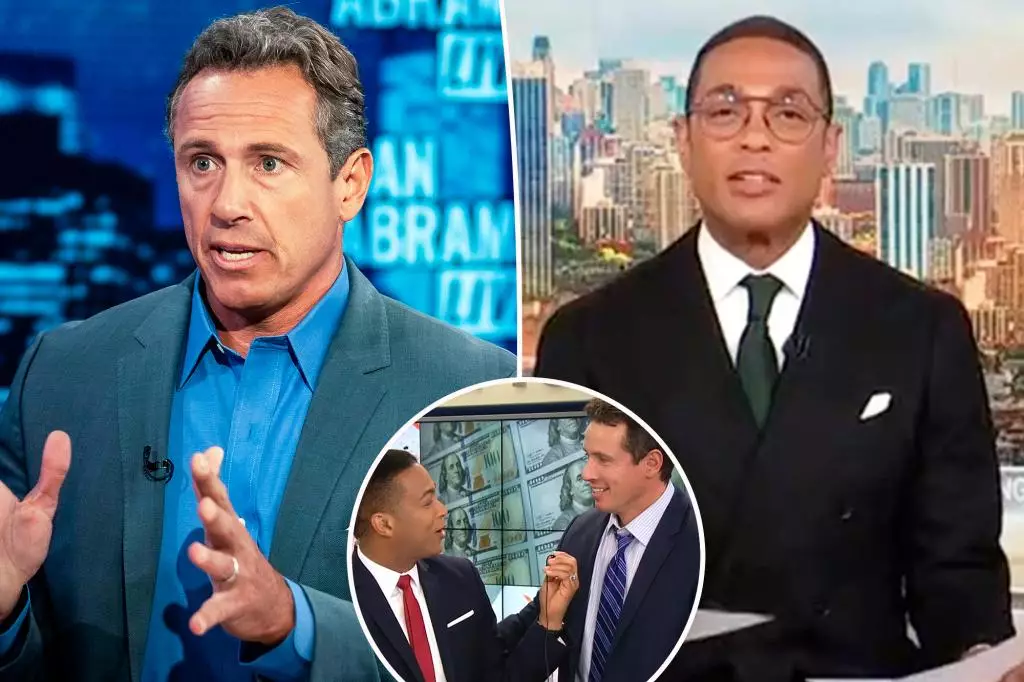In the world of television journalism, few pairings garnered as much attention and admiration as Chris Cuomo and Don Lemon. With an established history of dynamic handovers and an apparent camaraderie, the CNN duo seemed inseparable. They co-hosted “The Handoff,” a cleverly crafted segment that bridged their respective shows, “Cuomo Prime Time” and “Don Lemon Tonight.” Their banter, filled with warmth and mutual support, created an engaging atmosphere that kept their audiences invested. However, as is often the case in high-stakes media environments, the bonds that once flourished have since frayed into public discord.
The Breakdown of Loyalty
The unexpected downfall of their relationship came to a head following Chris Cuomo’s controversial exit from CNN amidst scandals involving his brother, former New York Governor Andrew Cuomo. Allegations of sexual harassment against Andrew led to suspensions and messy legal battles, casting shadows over Chris’s journalistic credibility. During an appearance on Patrick Bet-David’s “Home Team” podcast, Cuomo did not shy away from expressing his disappointment towards Lemon. His assertion, “I am a loyalty guy,” implies that he felt abandoned during those tumultuous times—a sentiment that reveals deeper fractures within what was once a seemingly solid friendship.
Lemon’s perceived lack of support is a critical focal point in this unraveling narrative. Chris’s frustration is echoed in the nuances of media relationships where loyalty often becomes an elusive quality when the personal and professional collide. The emotional charge in Cuomo’s comments underscores a universal truth about trust in competitive spaces; when the stakes rise, so too do the chances of betrayal.
Dissecting the Bromance Myth
What’s particularly intriguing is Cuomo’s shift in perspective regarding their previously posited friendship. He now claims that their friendly rapport was a product of former CNN President Jeff Zucker’s strategic vision to soften Lemon’s show. This assertion raises questions about the authenticity of their connection. Did the chemistry that captivated audiences develop organically, or was it merely a calculated maneuver designed to enhance ratings? Insiders have publicly pushed back on Cuomo’s narrative, labeling it a desperate ploy for attention rather than a factual recounting of events. One industry insider aptly stated, “If Chris’ lips are moving, he’s lying,” suggesting disbelief in Cuomo’s dramatic reinterpretation of their relationship.
However, the question isn’t just about what happened; it’s about the very nature of loyalty in the media landscape. Professional relationships can be fluid, often subject to manipulation by overarching corporate agendas. Cuomo’s comments illuminate the often hidden pressures journalists face—where genuine bonds can be questioned and relational integrity dissolved under the harsh spotlight of external expectations.
Reinventing Narratives Post-CNN
Both Cuomo and Lemon faced significant transformations following their departures from CNN. Chris Cuomo is now charting his own path with a primetime show at NewsNation, while Don Lemon has pivoted to hosting a YouTube show. This new phase presents them with opportunities to redefine their identities beyond the CNN brand. However, the friction between the two journalists continues to be highlighted in their respective media endeavors.
Cuomo has openly criticized Lemon’s current work, expressing apathy towards the content of Lemon’s YouTube show, which raises eyebrows about the professional and personal rivalry that seems to persist long after the CNN curtain fell. It seems that the animosity that erupted during their final days at CNN is not simply a fleeting emotion but rather an ongoing saga that will likely fuel their narratives for the foreseeable future.
The Media’s Double-Edged Sword
This situation serves as a microcosm of the media industry—a place where success can be fleeting and loyalties are often tested. The case of Cuomo and Lemon shows how quickly alliances can dissolve when popularity wanes or personal crises emerge. It’s a reminder of the precarious balancing act that journalists must navigate, weighing personal ethics against public personas, all while maintaining an audience’s trust.
The drama emerging from this tale of two journalists reflects the broader tensions within media houses, where personal relationships can mirror corporate strategies. As viewers, we must remain vigilant, understanding that what may seem like loyalty can sometimes be nothing more than a façade. The Cuomo-Lemon saga will undoubtedly continue to unfold, providing a captivating glimpse into the realities of life behind the news anchors’ polished exteriors.

